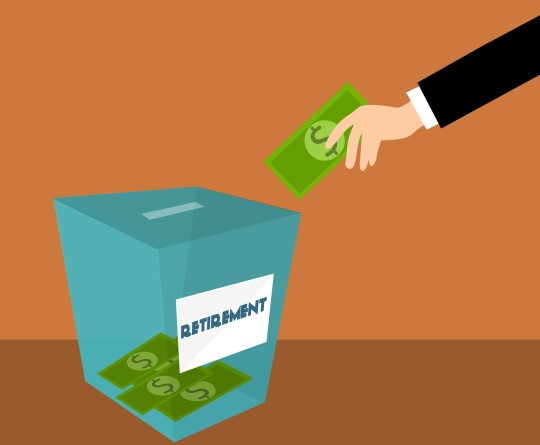#Retirement Savings
Explore tagged Tumblr posts
Text
Millennials who rent for their entire careers versus millennials who own property will have to save different amounts for retirement, according to a new report. The 2023 Mercer Retirement Readiness Barometer has found that Canadian millennials, between 27 and 42 years old, must save 50 per cent more if they rent, than millennials who are homeowners. In order to achieve a “reasonable income in retirement”, the report found a millennial who rents for their entire career would need to save eight times their salary in order feel ready to retire at age 68. However, if that same millennial owned their home, they would only need to save 5.25 times their salary in order to feel ready to retire at age 65.
Full article
Tagging: @politicsofcanada
#cdnpoli#canadian politics#canadian news#canada#canadian#retirement#retirement savings#millenials#income inequality
238 notes
·
View notes
Text



x
#401(k)#savings#tax-advantaged retirement#bipartisan legislation#wealth gap#federal budget#financial industry#lobbying#retirement security#tax law#retirement savings#bipartisan#wealth disparities#federal deficit#financial services industry#tax-advantaged accounts#tax breaks#Congress#lobbyists#Social Security#Medicare
18 notes
·
View notes
Text
youtube
Season 4, Episode 5: “401(k)s Aren’t Offered in My Industry. How Do I Save for Retirement if My Employer Won’t Help?”
Read the transcript.
7 notes
·
View notes
Text
Mastering the Art of Investing: Practical Strategies for Insightful Decision-Making
Key Point:
Making smart and insightful investment decisions is an attainable goal with the right strategies in place. By recognizing your limitations, managing emotions, seeking professional guidance, and aligning your investments with personal objectives, you can cultivate a robust and successful investment portfolio that stands the test of time.
Sound investment decisions are the bedrock of financial success. However, navigating the complex world of investing can be challenging, even for the most seasoned investors. This post explores practical strategies for making smart and insightful investment decisions, empowering you to grow your wealth with confidence and finesse.
Recognize the Limits of your Abilities
In both life and investing, it is crucial to acknowledge the boundaries of our expertise. Overestimating our abilities can lead to ill-advised decisions and, ultimately, financial losses. By cultivating humility and seeking external guidance when necessary, we can minimize risks and make more informed investment choices.
Manage Emotional Influence on Decision-Making
Emotions can significantly impact our ability to make rational decisions. To circumvent the sway of emotions, adopt a disciplined approach to investing, relying on data-driven analysis and long-term strategies rather than succumbing to impulsive reactions.
Leverage the Expertise of an Advisor
Engaging a professional financial advisor is a prudent investment decision. Their wealth of knowledge and experience can help you navigate market complexities and identify opportunities tailored to your financial goals, risk tolerance, and investment horizon.
Maintain Composure Amidst Market Volatility
Periods of market turbulence can incite panic among investors. However, it is essential to remain level-headed and maintain a long-term perspective during such times. Avoid making impulsive decisions based on short-term fluctuations and focus on your overarching financial objectives.
Assess Company Management Actions Over Rhetoric
When evaluating potential investments, examine the actions of a company's management rather than relying solely on their statements. This approach ensures a more accurate understanding of the organization's performance, financial health, and growth prospects.
Prioritize Value Over Glamour in Investment Selection
The most expensive investment options are not always the wisest choices. Focus on identifying value rather than being swayed by glamorous or high-priced options. This strategy promotes long-term financial growth and mitigates the risk of overpaying for underperforming assets.
Exercise Caution with Novel and Exotic Investments
While unique and exotic investment opportunities may appear enticing, approach them with caution. Ensure thorough research and due diligence before committing to such investments, as they may carry higher risks and potential pitfalls.
Align Investments with Personal Goals
Invest according to your individual objectives rather than adhering to generic rules or mimicking the choices of others. Personalized investment strategies are more likely to yield favorable results, as they account for your unique financial circumstances, risk appetite, and long-term aspirations.
Making smart and insightful investment decisions is an attainable goal with the right strategies in place. By recognizing your limitations, managing emotions, seeking professional guidance, and aligning your investments with personal objectives, you can cultivate a robust and successful investment portfolio that stands the test of time.
Action plan: Learn a few simple rules and ignore the rest of the advice you receive.
It’s easy to become completely overwhelmed by the volume of advice available about investing. However, you don’t need to become an expert on the stock market in order to become a good investor.
Just like an amateur poker player can go far if he simply learns to fold his worst hands and bet on his best ones, a novice investor can become very competent just by following a few simple rules. For example, he should learn not to overreact to dips in the market and make sure to purchase value stocks instead of glamour stocks.
#Financial freedom#Building wealth#Personal finance strategies#Investment advice#Passive income stream#Early retirement planning#Debt reduction#Budgeting tips#Saving money#Wealth management#Financial independence#Secure financial future#Retirement planning#Financial planning#Personal finance#Money management#Investment strategies#Retirement savings#Investment portfolio#Financial education#Wealth creation#Financial goals#Wealth building#Financial security#Retirement income#Passive income ideas#Financial advice#Financial wellness#Financial planning tools#Financial management
33 notes
·
View notes
Text
youtube
[1:03] Working longer is more of a convenient untruth than any kind of plan or analysis. First of all, you hear that everybody is living longer, so why can’t we work longer? … [1:36] Living longer is not the same thing as being able to work longer or being more attractive to an employer. Half the people who are retired say that they didn’t retire, they “were retired.” They were pushed out of their jobs because of a layoff, a reorganization, their own health — physical or mental — or the health of their spouse forced them to withdraw from the labor force. We saw huge exits of older people, and I’m not talking 60s or 70s, I’m talking people in their 50s. Only half the people between the ages of 50 and 65 have continuous employment. So this idea — that if you didn’t save enough you could actually work longer — is a canard, it just isn’t true on its face.
Emphasis mine. I’ve heard people say, perhaps as a grim joke, that they plan to work until they drop from this earth because they don’t make enough to save for retirement, but the sad truth is that that’s unlikely to be a viable strategy.
2 notes
·
View notes
Text
Top Investment Strategies for Millennials
As millennials enter the workforce and begin building their financial futures, investing becomes a key component of wealth growth and long-term financial stability. To make informed investment decisions and achieve their financial goals, millennials need to explore the top investment strategies available to them. In this article, we’ll delve into some of the best investment strategies for…

View On WordPress
#Financial Freedom#Financial Goals#Financial Planning#Index Funds#Investment Strategies#Investments#Millennials#Personal Finance#Real Estate#Retirement Accounts#Retirement Planning#Retirement Savings#Wealth Growth
7 notes
·
View notes
Text

Retirement Planning Strategies : A must read guide 💰
#finance#retirement#pension#economy#retirement planning#retirement plans#retire early#financial security#retirement savings#retirement advisor#retirement strategies#retired
4 notes
·
View notes
Text
"The privatization of pension funding is inherently inequitable" and "You still need to try and save your own money for a rainy day" are concepts that can coexist, and the resolution should be to expand Social Security but good luck with that given the horse's ass in the White House at present. At least Canada is attempting, in fits and starts, to expand CPP and OAS.
(To elaborate on the first sentence a bit, the expansion of RRSPs in Canada and 401(k)s in the USA are a way to transform defined-benefit plans into defined-contribution plans where a company effectively washes its hands of any obligations to you, the worker, upon your retirement.)
Telling poor people that signing up for a 401K makes them evil is not praxis you stupid, stupid motherfucker.
#retirement savings#savings#social security#401(k)#food for thought#my thoughts let me show you them
10K notes
·
View notes
Text
The brief’s key findings are:
Long-term care (LTC) costs are generally not well insured, posing a significant risk for older households as they age.
Using new survey data, the analysis compares what respondents say they would do if LTC costs exceeded their resources to what people like them actually do.
The key results are:
many plan to rely on Medicaid, but, in reality, only a small fraction will meet its strict eligibility criteria;
in contrast, people do not expect to tap home equity, but typically end up doing so; and
among those who do need LTC services, few find it necessary to move in with their kids, but they do expect to leave them less money.

0 notes
Text
Best Way to Save for Retirement Without 401(k)
Why Saving for Retirement Without a 401(k) MattersBest Way to Save for Retirement Without 401(k)1. Open an Individual Retirement Account (IRA)2. Consider a SEP IRA or SIMPLE IRA if You’re Self-Employed3. Invest in a Taxable Brokerage Account4. Take Advantage of a Health Savings Account (HSA)5. Real Estate Investing for Passive Income6. Build a Diversified Investment Portfolio7. Maximize Social…
0 notes
Text

Achieve financial success with expert wealth management. Optimize your investments, plan for retirement, and grow your assets with personalized financial strategies.
#wealth management#financial success#investment strategy#personal finance#retirement planning#asset management#financial planning#wealth building#financial goals#risk management#investment advice#financial freedom#wealth growth#money management#long-term investments#financial advisor#retirement savings#portfolio management#financial security#wealth optimization#financial expert.
0 notes
Text
How to Unlock Early Retirement: 5 Smart Ways to Bridge the Gap Before 59 1/2
Dreaming of early retirement and escaping the 9-to-5 grind to embark on a life of adventure before you hit the traditional retirement age? You’re not alone! Many people, like us at Retire Young Travel Smart, are increasingly drawn to the idea of early retirement. But a common question arises, especially for those of us in the U.S.: How do you fund early retirement before 59 1/2 when most of your…
#401k#72t#Bridge the Gap#budget travel#Early Retirement Strategies#financial independence#financial planning#FIRE#healthcare#IRA#pension#retire abroad#Retire early#Retirement Savings#Roth Conversion Ladder#Rule of 55#SEPP#slow travel
0 notes
Text
Workers in their 60s who have this employee benefit have more flexibility to deal with health crises - their own, a parent's, or a spouse's.
0 notes
Text
Investing for Beginners: A Guide to Getting
Written by: D. Marshall Jr Are you looking to take control of your financial future but don’t know where to begin? You’re not alone! Many people find investing intimidating, but it doesn’t have to be. In this comprehensive guide, we’ll break down the basics of investing and provide you with valuable insights on how to start your journey, even if you have little money to spare. Why…
#Beginner Investing Tips#Bonds#ETF’s#Financial Literacy#How to Start Investing#Investing for beginners#Investing with Little Money#Investment strategies#Mutual Funds#Personal Finance Tips#Retirement savings#Stock Market Basics#Stocks
1 note
·
View note
Text
How to Work Less to Achieve More
Key Point:
keep your attention on an important task by adopting hyperfocus. When you hyperfocus, you rid your environment of distractions, and become aware of what’s occupying your mind. What’s more, every time your attention strays, redirect it. Remember is that scatterfocus can help you with tricky problems that require creative solutions. With scatterfocus, you allow the mind to wander and make unusual connections. You can help create scatterfocus by nourishing your mind and allowing time to reflect.
In our fast-paced world, working long hours has become the norm. However, the key to achieving more is not simply working harder or longer—it's about working smarter. In this article, we will explore strategies to help you work less while accomplishing more. By training yourself to enjoy hyperfocus, cultivating meta-awareness and intentional focus, eliminating distractions, harnessing the power of scatterfocus for creative thinking, connecting seemingly unrelated information, and nourishing your mind, you can optimize your productivity and achieve greater success.
Train yourself to enjoy hyperfocus more.
Hyperfocus is a state of intense concentration where you become fully immersed in a task or activity. To work less and achieve more, it's important to train yourself to enjoy and leverage hyperfocus. Set clear goals, break tasks into manageable chunks, and eliminate distractions. Engage in activities that naturally captivate your attention and give you a sense of fulfillment. By training yourself to enjoy hyperfocus, you can maximize productivity and accomplish more in less time.
Meta-awareness and intentional focus are key to managing your attention.
Meta-awareness refers to being aware of your own thoughts and mental processes. Intentional focus involves directing your attention consciously and purposefully. Cultivating these skills is essential for effective attention management. Develop the ability to notice when your mind starts to wander and gently bring your focus back to the task at hand. By practicing meta-awareness and intentional focus, you can reduce time wasted on distractions and stay on track to achieve your goals.
Achieve hyperfocus by ridding your environment of distractions.
Distractions can significantly impact productivity and hinder your ability to work efficiently. Create a conducive work environment by minimizing distractions. Turn off notifications on your phone, close unnecessary browser tabs, and create a physical workspace that promotes focus. Consider using productivity tools or apps that block or limit access to distracting websites or applications. By eliminating external distractions, you can enter a state of hyperfocus and accomplish more in less time.
Scatterfocus helps you plan and think creatively.
Scatterfocus is the practice of intentionally allowing your mind to wander and explore different ideas, without a specific goal or objective. This mental state can be beneficial for planning and creative thinking. Set aside dedicated time for scatterfocus, allowing your mind to freely explore different thoughts and possibilities. Embrace daydreaming, engage in activities that stimulate your imagination, and give yourself permission to think outside the box. By incorporating scatterfocus into your work routine, you can generate fresh ideas and enhance your problem-solving skills.
Use scatterfocus to connect the dots between seemingly unrelated bits of information.
One of the unique benefits of scatterfocus is its ability to facilitate connections between seemingly unrelated information. During moments of scatterfocus, your mind can make unexpected connections and insights. Capture these ideas by carrying a notebook or using a note-taking app to jot down your thoughts. When you revisit these notes later, you may discover valuable connections and insights that can fuel your productivity and lead to innovative solutions.
Nourish your mind to make the most of scatterfocus.
To optimize scatterfocus and enhance your overall productivity, it's important to nourish your mind. Engage in activities that promote mental well-being, such as regular exercise, quality sleep, and mindfulness practices. Take breaks throughout the day to recharge and refresh your mind. Additionally, fuel your brain with nutritious foods that support cognitive function, such as fruits, vegetables, whole grains, and omega-3 fatty acids. By prioritizing self-care and nourishing your mind, you can maximize the benefits of scatterfocus and achieve more with less effort.
Working less while achieving more is within your reach. By training yourself to enjoy hyperfocus, cultivating meta-awareness and intentional focus, eliminating distractions, harnessing the power of scatterfocus for creative thinking, connecting seemingly unrelated information, and nourishing your mind, you can optimize your productivity and achieve greater success. Remember, it's not about working longer hours, but about working smarter. Embrace these strategies, experiment with different techniques, and find the balance that works best for you. As you implement these practices, you'll discover the power of effective attention management and witness your productivity soar.
Action Plan: Have a cup of coffee to help you hyperfocus.
Caffeine and hyperfocus are a match made in heaven. Caffeine keeps you alert and focused. It helps you persevere when work gets boring. And perhaps most importantly, it can improve your performance on a number of cognitive tasks. So the next time you need a burst of intense concentration, make sure you’ve got a cup of coffee to hand – if nothing else, it tastes wonderful.
#Financial freedom#Building wealth#Personal finance strategies#Investment advice#Passive income stream#Early retirement planning#Debt reduction#Budgeting tips#Saving money#Wealth management#Financial independence#Secure financial future#Retirement planning#Financial planning#Personal finance#Money management#Investment strategies#Retirement savings#Investment portfolio#Financial education#Wealth creation#Financial goals#Wealth building#Financial security#Retirement income#Passive income ideas#Financial advice#Financial wellness#Financial planning tools#Financial management
14 notes
·
View notes
Text
Tax-advantaged savings has become a staple of the American retirement system, with 60 million savers squirreling away $6.6 trillion in their 401(k)s, alone. … [But] that success now vexes many retirement experts, alarmed by how easily Congress acquiesces to tax breaks for retirement savings that disproportionately help the wealthy while treating the benefits relied upon by most retirees — Social Security and Medicare — as budget-busters ripe for reform. … The latest expansion of private retirement savings comes at a time when Social Security, which the majority of American seniors rely on to cover basic living expenses, faces insolvency in 2034. Secure 2.0 sailed through Congress shortly before lawmakers convened working groups to try to fix Social Security’s $119 billion cash shortfall, which amounted to less than half of a single year’s worth of tax benefits for retirement savings that mostly go to higher earners. … The success of the retirement industry and its advocates in Congress has put a sinkhole in the federal budget at a time when entitlements are under threat. While the cost to the Treasury for tax-advantaged retirement savings was $81 billion in 1995, it has since swelled to over $369 billion in 2023 and, in the wake of Secure 1.0 and 2.0, is expected to nearly double to $659 billion in 2027.
#401k#401(k)#Social Security#retirement savings#lobbying#long reads#SECURE Act#SECURE 1.0#SECURE 2.0#retirement
4 notes
·
View notes